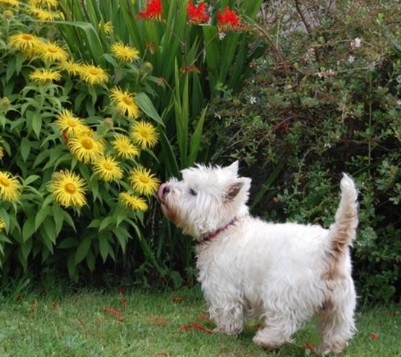Summertime is nearly here, and in Houston, the temperatures are already climbing. As you plan more barbeques and pool parties, your poor pet often gets left behind. To make up for that, you might let them in the backyard with you while you both catch some rays. With all the summertime fun going on around you, maybe you don’t keep your eyes on your dog or cat as much as you should.
They start sniffing around your garden or other greenery. You don’t see them take a bite of a plant, but they do. Before you know it, your pet is nauseous, vomiting, and maybe even at risk of death. What went wrong?
Just like us humans can’t eat every single plant we come across, neither can pets. Animals generally have a much more sensitive gastrointestinal tract than we do, which is why you’re not advised to give them people food. By knowing which plants are toxic to pets, you can be more proactive this summer. Whether that means only letting pets in the backyard with supervision or removing offending plants from your garden, be smart.
Here are the plants to avoid.
- Garlic: You may love garlic to spice up lunch and dinner foods, but pets don’t share the same sentiment. All types of garlic, among them rocambole, serpent garlic, nectar of the gods, camphor of the poor, rustic treacle, and stinking rose have N-propyl disulfide. This can cause panting, an elevated heart rate, feelings of weakness, blood in a pet’s urine, blood cell damage (in the form of Heinz body anemia and hemolytic anemia), and vomiting.
- Apricots: Although not a commonly-grown fruit in Texas, if you do have apricots in your yard, beware! The Prunis armeniaca are dangerous for both cats and dogs to consume. The cyanide in the seeds, leaves, and stems can lead to shock, panting, and breathing problems.
- Daisies: The Shasta Daisy, also known as Crysanthemum maximum, is commonly seen around Houston and other parts of Texas. Most common daisy species can cause trouble for your pets. There’s tons of toxins in these flowers, such as pyrethrins, lactones, and sequiterpene. Pets may exhibit dermatitis or skin irritation, lack of coordination, extreme salivating, diarrhea, and vomiting.
- Jade plant: The simple jade plant, or Crassula argentea, also goes by the name Japanese rubber plant, Chinese rubber plant, jade tree, dwarf rubber plant, and baby jade. No matter what you call it, it can lead to lack of coordination, depression in pets, and vomiting. It’s unknown what’s so toxic about these plants when consumed, but keep your pets away nevertheless.
- Begonia: A popular plant in Texas, begonia is no good for pets. These pretty pink flowers contain soluble calcium oxalates. When pets eat begonia, they may start salivating excessively, vomit, and even have kidney failure. This is more common for animals like horses than cats or dogs, though.
- Roman chamomile: Like other types of chamomile, the Roman chamomile is bad for pets to consume. These also go by ground apple and garden chamomile. There’s many toxic elements in these lovely white flowers, among them tannic acid, anthemic acid, chamazulene, bisabolol, and volatile oil. Your pet may have an allergic reaction that includes diarrhea, vomiting, and skin redness and irritation. If a cat or dog keeps getting into Roman chamomile, they could start bleeding and develop anorexia. This is one of the more serious plants to keep from your pet.
- Oilcloth flower: In the family Araceae, the oilcloth flower also masquerades as the painter’s pallet, flamingo flower, pigtail plant, tail flower, flamingo lily, and flamingo plant. These red plants are named after flamingos due to their hue. Beyond their looks, they have insoluble calcium oxalates when eaten. Look for whether your cat or dog can swallow as well as vomiting, drooling, and irritation and burning on the lips, tongue, and mouth.
- True aloe: Aloe barbadensis or true aloe (also known as Barbados aloe and medicine plant) may sooth our skin woes, but it doesn’t do anything good for pets. Urine may become red if eaten, and your pet will likely vomit. This is due to the aloin or glycosides, anthracene, and anthraquinones within the plant.
- Oleander: A very popular evergreen shrub with delicate flowers. However, the leaves and flowers are extremely toxic if ingested to even humans and can cause severe vomiting, slow the heart rate and possibly even cause death.
- Azalea: Azaleas are so beautiful and very common but can have serious effects on animals. Eating even a few leaves can result in vomiting, diarrhea and excessive drooling.
Make it your best summer yet with your cat or dog by being proactive about these toxic plants. Of course, now that you know what to look for, you should call a vet immediately if your pet begins showing any of the above symptoms. Have a safe, fun, happy summer!

